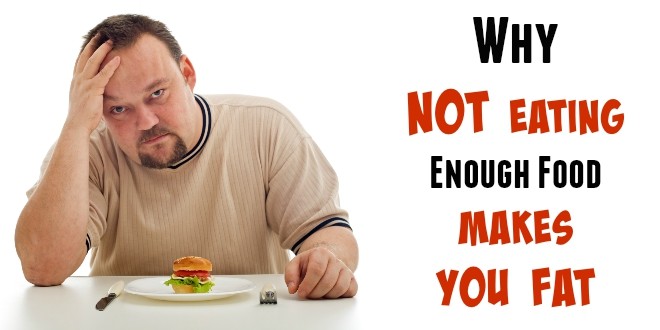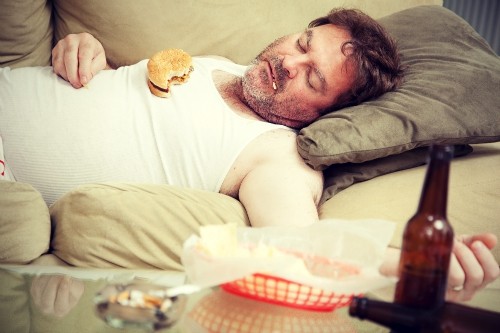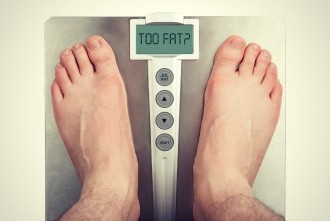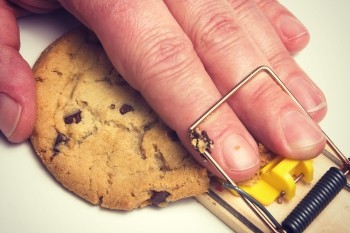Diet Tips 101: Why Not Eating Enough Food Makes You Fat

If you have decided to get serious about losing weight, then you have probably started to make far more sensible choices with your diet, as well as incorporating a solid exercise routine.
[caption id="attachment_19785" align="alignright" width="374"] Eat too much? No exercise? Now that makes sense for "weight gain"...[/caption]
Eat too much? No exercise? Now that makes sense for "weight gain"...[/caption]
Or maybe you haven't.
Maybe you've bought into the latest diet marketed to the masses? Whether it be the "HCG diet", "low-fat-low-carb-high-protein", " Atkins Diet ", some new "miracle diet pill", or the latest newfangled " detox diet ", DIET is still a 4-letter word.
However, unknown to most people, one of the biggest reasons people gain weight is simply NOT eating enough. Counter-intuitive? Absolutely!
Although a healthy diet and plenty of exercise are essential tools for losing weight on a consistent basis, there is such a thing as too much of a good thing.
In the enthusiastic early days of a diet, many people tend to take a far more restrictive approach than is necessary. Cutting your calories too low too soon can actually be counter-productive, as we're going to explore today.
[caption id="attachment_19793" align="alignleft" width="330"] Too Fat on the Scale[/caption]
Too Fat on the Scale[/caption]
The body is a very intelligent machine in the sense that it knows how to effectively regulate its many processes to support homeostasis.
In the context of dieting and weight loss, this means that if you restrict your food intake too drastically, your body will simply decrease its metabolic rate so it is burning fewer calories.
Of course, if your body begins to burn fewer calories each day, than it is going to be far more difficult for you to lose weight, but the problem is even greater than that.
[tweet_box design="box_12"]One of the biggest reasons people gain weight is simply NOT eating enough food, period![/tweet_box]
If you are providing your body with the energy it needs to fuel your daily activities, then it will have to begin sourcing it from somewhere else. You might be thinking the first place it will look is your stored body fat, but it is far easier for your body to begin breaking down your lean muscle mass so it can be converted to glucose and burned for energy.
This result is a snowball effect, where you are holding less muscle, meaning your metabolism begins to dwindle even further.
Before you know it, you will have essentially crashed your metabolism. As a result, you will have to gain some of what you have lost by eating more food, simply to get your metabolic rate back up again.
[box type="info" align="aligncenter" class="" width=""]
...and when I say weight, I'm referring to body fat.
Follow these guidelines and you'll not only reach your goals, but you won't starve yourself in the process --- after all, [tweet_dis]UNDER-EATING is just as bad as overeating as far as the scale is concerned![/tweet_dis][/box]
[caption id="attachment_19794" align="alignright" width="350"] If all else fails, there's always the Mouse-Trap Diet[/caption]
If all else fails, there's always the Mouse-Trap Diet[/caption]
When you first start dieting to lose weight, the best thing to do is to cut around 300-500 calories from your regular diet, or your 'maintenance calories'.
To figure out your maintenance calories, you can use a basal metabolic rate or BMR Calculator ; this will tell you how many calories you need to consume to maintain your current body weight.
Cutting just a few hundred calories each day will enable you to lose somewhere in the region of 1 - 3 lbs per week, which is just about right to make sure you are predominantly losing fat and not muscle.
If your weight loss stalls for a week or two, then you can simply cut another couple of hundred calories or consider adding a little extra exercise.
Remember that when it comes to weight loss, less is often more, so there is no need to go to extremes to meet your goals.
[caption id="attachment_19785" align="alignright" width="374"]
 Eat too much? No exercise? Now that makes sense for "weight gain"...[/caption]
Eat too much? No exercise? Now that makes sense for "weight gain"...[/caption]Or maybe you haven't.
Maybe you've bought into the latest diet marketed to the masses? Whether it be the "HCG diet", "low-fat-low-carb-high-protein", " Atkins Diet ", some new "miracle diet pill", or the latest newfangled " detox diet ", DIET is still a 4-letter word.
However, unknown to most people, one of the biggest reasons people gain weight is simply NOT eating enough. Counter-intuitive? Absolutely!
Although a healthy diet and plenty of exercise are essential tools for losing weight on a consistent basis, there is such a thing as too much of a good thing.
In the enthusiastic early days of a diet, many people tend to take a far more restrictive approach than is necessary. Cutting your calories too low too soon can actually be counter-productive, as we're going to explore today.
Why Not Eating Enough Food Causes You To Gain Weight aka " Crashing On Your Crash Diet "
[caption id="attachment_19793" align="alignleft" width="330"]
 Too Fat on the Scale[/caption]
Too Fat on the Scale[/caption]The body is a very intelligent machine in the sense that it knows how to effectively regulate its many processes to support homeostasis.
In the context of dieting and weight loss, this means that if you restrict your food intake too drastically, your body will simply decrease its metabolic rate so it is burning fewer calories.
Of course, if your body begins to burn fewer calories each day, than it is going to be far more difficult for you to lose weight, but the problem is even greater than that.
[tweet_box design="box_12"]One of the biggest reasons people gain weight is simply NOT eating enough food, period![/tweet_box]
If you are providing your body with the energy it needs to fuel your daily activities, then it will have to begin sourcing it from somewhere else. You might be thinking the first place it will look is your stored body fat, but it is far easier for your body to begin breaking down your lean muscle mass so it can be converted to glucose and burned for energy.
This result is a snowball effect, where you are holding less muscle, meaning your metabolism begins to dwindle even further.
Before you know it, you will have essentially crashed your metabolism. As a result, you will have to gain some of what you have lost by eating more food, simply to get your metabolic rate back up again.
[box type="info" align="aligncenter" class="" width=""]
3 Tips to consider when trying to Lose Weight
...and when I say weight, I'm referring to body fat.
- Ensure you are drinking enough water each and EVERY day
- Know your body fat to lean muscle ratio - feed your muscle, starve your fat - base your daily need (or BMR) on lean mass not body weight
- Practice the 40/60 split when reducing calories i.e. if you are trying to cut 500 calories per day, then cut 40% from diet and 60% with exercise (eat 200 calories less than your BMR and burn 300 calories with exercise)... I like food too much.
Follow these guidelines and you'll not only reach your goals, but you won't starve yourself in the process --- after all, [tweet_dis]UNDER-EATING is just as bad as overeating as far as the scale is concerned![/tweet_dis][/box]
How to Effectively Start a Diet and Succeed
[caption id="attachment_19794" align="alignright" width="350"]
 If all else fails, there's always the Mouse-Trap Diet[/caption]
If all else fails, there's always the Mouse-Trap Diet[/caption]When you first start dieting to lose weight, the best thing to do is to cut around 300-500 calories from your regular diet, or your 'maintenance calories'.
To figure out your maintenance calories, you can use a basal metabolic rate or BMR Calculator ; this will tell you how many calories you need to consume to maintain your current body weight.
Cutting just a few hundred calories each day will enable you to lose somewhere in the region of 1 - 3 lbs per week, which is just about right to make sure you are predominantly losing fat and not muscle.
If your weight loss stalls for a week or two, then you can simply cut another couple of hundred calories or consider adding a little extra exercise.
Remember that when it comes to weight loss, less is often more, so there is no need to go to extremes to meet your goals.




































































































